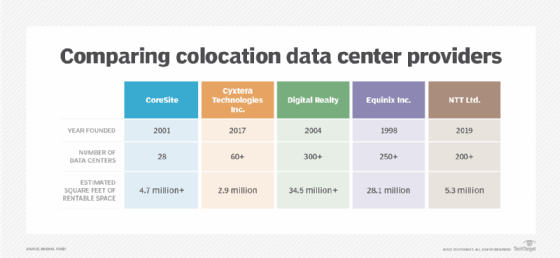Top 5 colocation providers of 2024
Colocation companies offer a wide range of facilities and services that can help reduce costs of managing data centers. Compare providers to see which is best for your organization.
There's a growing demand for third-party, on-premises data centers that enable organizations to reduce or eliminate expenses related to managing power, connectivity, space and cooling. However, selecting a data center to host an organization's equipment is not easy, as there are numerous colocation providers that offer a multitude of services and contracts.
What is colocation?
Colocation services can best be thought of as fractional data center leasing. Rather than incurring the cost of building, purchasing or leasing an entire data center, colocation -- sometimes referred to as colo -- enables organizations to share data center costs with other businesses by leasing only the amount of data center space they need.
Colocation data center facilities serve a few different uses. First, colocation space is sometimes an in-between option when neither on-premises data centers nor the public cloud are good fits for an organization. In these situations, colocation enables an organization to provide its own servers and other data center hardware, while the colocation facility provides the network connectivity, physical security and redundancy. As such, an organization can operate workloads just as they would on premises. Colocation gives organizations more flexibility than using hyperscale clouds because the organization uses and configures its own hardware, along with the OSes and software running on that hardware. At the same time, colocation eliminates the cost of building and maintaining a private data center.
A second common use is for redundancy or disaster recovery purposes. An organization that already has its own private data center might use a colocation center as a disaster recovery facility. That way, if something happens to the organization's primary data center, workloads could fail over to the colocation center.
A third common use for colocation services is that they enable easy data center expansion. If an organization outgrows its private data center, it could lease space in a colocation facility to supplement the space that it has on-site. This approach is far less costly than building a new data center or expanding an existing data center.
Regardless of the use, one of the key benefits of colocation is that because the colocation facility handles things such as connectivity, power and cooling, the IT staff is freed up to work on more important things. Leasing space in a colocation facility can also help an organization reduce its IT staffing and equipment-related costs.

Top colocation providers
Let's examine what five leading colocation service providers offer.
1. CoreSite
CoreSite, an American Tower company, operates 28 locations in the U.S., with partners managing international locations. Founded in 2001 as part of The Carlyle Group's portfolio, CoreSite's key focus is on high-performance data center offerings in communication hubs across the U.S., including Atlanta, Boston, Chicago, Denver, Los Angeles, Miami, New York, Washington, D.C. and the Silicon Valley. The company offers over 450 network providers and over 35,000 interconnections. CoreSite's data centers collectively consist of more than 4.7 million square feet of floor space.
Notable features and specs include the following:
- CoreSite operates locations in 11 key U.S. markets.
- The company's service-level agreement (SLA) offers a 100% uptime guarantee.
- CoreSite offers hybrid cloud options with interconnects to the Amazon, Microsoft, Google, Oracle, IBM and Alibaba clouds.
- CoreSite provides move-in assistance with dedicated project management resources.
- The company operates the CoreSite Open Cloud Exchange cloud platform.
Key takeaway: CoreSite's key differentiator is its ability to maintain a high quality of service as measured by low latency, high availability and traffic throughput.
2. Cyxtera Technologies, Inc.
Cyxtera operates more than 60 data centers in North America, Europe and the Asia-Pacific region. Launched in May 2017 with the acquisition of CenturyLink's data center and colocation assets, Cyxtera operates 2.9 million square feet of data center floor space with a 250-megawatt capacity.
Notable features and specs include the following:
- The company operates locations in key global markets, servicing over 30.
- Cyxtera's SLA offers a 99.999% availability and a 100% power uptime guarantee.
- Cyxtera manages all wiring from the cage to the network room.
- The company strictly adheres to industry standards for cabling and data center design, including TIA-942.
Key takeaway: Cyxtera technicians hold numerous certifications, including Project Management Professional, ITIL, Cisco CCNA, Nokia Service Routing Certification and Certified Data Management Professional.
3. Digital Realty
Digital Realty operates more than 300 data centers in over 25 countries across six continents, with a combined total of more than 34.5 million square feet of rentable space. As of 2023, several million additional square feet are under development.
Digital Realty was founded in 2004 with an American IPO but expanded to Europe in 2005 and Asia in 2010.
Notable features and specs include the following:
- The company's U.S. colocation facilities are 100% wind-powered.
- Digital Realty offers seamless interconnectivity to partners, customers and service providers.
- Digital Realty offers four different data center tiers, with increasing levels of uptime. A tier 1 data center has an uptime of 99.6%. Those numbers increase to 99.7%, 99.8% and 99.99% for tiers 2, 3 and 4 respectively.
- Customer data is kept secure through a five-step validation process.
Key takeaway: Digital Realty is focused on sustainability, with more certified green buildings than any other colocation provider.
4. Equinix, Inc.
Equinix operates more than 250 data centers in 71 major metropolitan areas around the world. It recently expanded services to Africa. The company offers an estimated 28.1 million square feet of data center space.
Equinix was founded in 1998 in Redwood City, Calif. The company specializes in internet and data centers, with a focus on risk mitigation.
Notable features and specs include the following:
- Equinix data centers guarantee 99.9999% availability.
- The company offers Business Continuity Trading Rooms (BCTRs) to financial trading companies.
- Equinix achieved 100% renewable energy in some regions and has 223 sites with 100% renewable energy coverage.
- Physical data center access typically involves passing through five security checkpoints.
Key takeaway: Equinix's massive global presence, industry-leading SLAs and offerings such as BCTRs make this colocation provider well suited for use by financial services companies.
5. NTT Ltd.
NTT operates more than 200 data centers in 20 countries across four continents, including North America, Europe, Asia and Africa.
Founded in 1952, NTT was known at the time as Nippon Telegraph and Telephone Corp. Today, the company operates as NTT Ltd., headquartered in Tokyo, Japan.
Notable features and specs include the following:
- NTT's America Enterprise Cloud Flex Service Level Agreement guarantees 100% network uptime.
- NTT is one of the largest global Tier 1 IP backbone providers in Asia.
- The company claims to have the world's largest portfolio of Tier 3 data centers.
- NTT complies with more than 300 global data center standards.
- The company offers a 24/7 remote hands service for troubleshooting and maintenance.
Key takeaway: A relative newcomer, NTT Ltd. places a heavy emphasis on network performance and compliance with global standards for data center operation.
How do you choose the right colocation provider?
Before choosing a colocation provider, an organization must understand its current and future business needs and IT requirements. An organization should answer the following questions before selecting a colocation company and signing a contract.
- What does the organization hope to achieve by using a colocation data center? For example, is the goal to reduce costs, or will the colocation facility act as a failover data center or provide additional floor space beyond what the organization currently has in its own data center? Answering this question will help determine if a particular colocation provider is in a position to help you meet the organization's objectives.
- How much floor space will the organization need in the colocation facility? The organization also needs to consider the number of racks and cabinets it will need, as well as whether it will be required to provide these items or if the colocation facility will provide them.
- What specific items and services does the organization need the colocation site to provide? Floor space, power and cooling are a given, but there are additional considerations. These might include security monitoring, high-speed interconnects to other data centers or other essential items.
- What is the organization's budget? Facilities for colocation data center providers vary widely in terms of cost. The lease price is based on a number of different factors, including the amount of floor space the organization is leasing, the city in which the colocation facility resides and the amount of power the organization will be consuming. Cost can also vary based on the ancillary items the colocation facility will be providing and whether bandwidth is included in the price.
- What is the time period of the lease the organization needs? Although there are boutique colocation companies that offer extremely flexible leasing plans, larger colocation providers might require annual or even multiyear leases. It's sometimes possible to get a better price by agreeing to a longer lease period.
- Will the organization need access to the facility? Unlike a private data center, not all colocation facilities will allow their customers to enter the facility. Although some providers do allow customers physical access to their hardware, others require the use of remote hands, meaning that the provider's staff handles hardware installations, reboots, upgrades and other similar tasks -- usually for a fee.
- What level of support will the organization require? Given that equipment will be installed at a remote location, consider the level of technical support the organization might need. Some providers offer comprehensive support for enterprise workloads, while other providers only offer support as it relates to those items that are under the provider's direct control, such as power and connectivity.
- Where is the nearest data center located? If a colocation provider allows physical access to its data center, then an organization must consider the data center locations. Having physical access is of little benefit if the nearest data center is thousands of miles away. Even if you don't need physical access to the data center, the data center's location remains an important consideration, since there is usually a direct correlation between geographic distance and network latency.
Brien Posey is a 15-time Microsoft MVP with two decades of IT experience. He has served as a lead network engineer for the U.S. Department of Defense and as a network administrator for some of the largest insurance companies in America.







